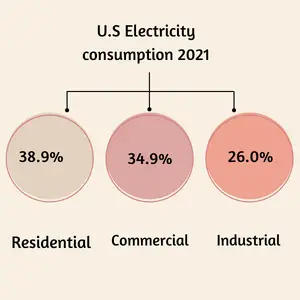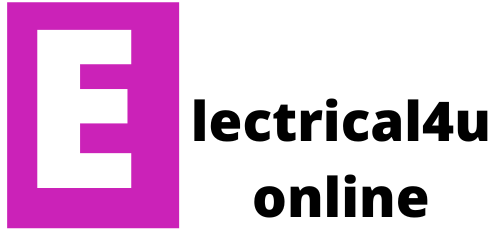Electricity is an economical method of producing various types of energy needed to run homes, factories, and large industrial applications. It can be precisely measured cost and controlled to benefit us.
Table of Contents
Why is electrical energy important?
Electrical energy is important for several reasons, playing a crucial role in modern society. Here are some key reasons why electrical energy is of paramount importance:
- Ubiquity and Versatility:
- Electrical energy is versatile and can be easily converted into different forms of energy such as heat, light, and mechanical energy. This versatility makes it applicable across a wide range of uses and industries.
- Powering Homes and Businesses:
- It is the primary source of power for homes, businesses, and industries. It provides the energy needed to operate lights, appliances, machinery, and electronic devices essential for daily activities and economic productivity.
- Technological Advancements:
- Many technological innovations and devices, from smartphones and computers to medical equipment and transportation systems, rely on electrical energy. It is a driving force behind technological progress and innovation.
- Communication and Information Exchange:
- The modern communication infrastructure, including the Internet and telecommunications systems, relies heavily on electrical energy. It facilitates global communication, information exchange, and the functioning of digital platforms.
- Transportation:
- Electrical energy is essential for the development of sustainable transportation. Electric vehicles (EVs) are becoming increasingly important in efforts to reduce dependence on fossil fuels and mitigate environmental impacts.
- Healthcare:
- Electrical energy is vital in the healthcare sector, powering medical equipment, diagnostic devices, and life-saving machines. Hospitals, clinics, and medical research facilities heavily rely on a stable and continuous supply of electrical power.
- Quality of Life:
- Electrical energy enhances the overall quality of life by providing convenience, comfort, and access to a wide range of services. It contributes to advancements in various fields, making life safer, more efficient, and enjoyable.
- Industrial Processes:
- Industries use electrical energy to power machinery and equipment in manufacturing processes. It contributes to the efficiency and automation of production, thereby enhancing productivity.
- Education and Research:
- In educational institutions, electrical energy is used to power classrooms, laboratories, and electronic devices essential for teaching and learning. It supports research activities and the development of new technologies.
- Agriculture:
- Modern agriculture relies on electrical energy for irrigation systems, machinery, and other technologies that improve crop yield and efficiency.
- Entertainment and Leisure:
- Electrical energy is essential for various forms of entertainment, including television, gaming, and streaming services. It contributes to the cultural and recreational aspects of society.
- Safety and Security:
- Electrical energy is crucial for powering security systems, lighting, and surveillance equipment, contributing to public safety and the protection of property.
Electrical energy is a cornerstone of modern civilization, underpinning numerous aspects of daily life, economic activities, and technological advancements.
Its importance is evident across various sectors, and the continued development of reliable and sustainable electrical energy sources is essential for the well-being and progress of societies around the world.
Why is Electricity more efficient than other types of Energy?
Electricity is more efficient than other types due to the following reasons mentioned below:
- The electrical energy source is an efficient form of energy when compared to the other types of energy as it can be transformed from one form to another. For instance, we want to convert electricity into energy, that is, heat. It is only necessary to transfer the electrical energy via a high-resistivity wire.
- The most crucial factor of the superiority of electrical energy over other forms of energy is its flexibility. It can be easily transferred from one location to another location with the help of conductors and overhead power lines.
- The electrical energy source is considered the most cost-effective energy source of all kinds. It is more affordable than other energy sources. It is widely employed for domestic, industrial, commercial, and residential.
- The consumers of electricity generally are situated far away from the generation center. Electricity is easily transferred from the generation center to the end-users using overhead transmission lines. Which means no noise from generators.
What are the uses of Electrical Energy?

Electrical energy is used in a wide range of applications across various sectors. Here are some common uses of electrical energy:
- Lighting:
- Illumination in homes, offices, streets, and public spaces is a primary use of electrical energy. Incandescent bulbs, fluorescent lights, LED lights, and other lighting technologies rely on electricity.
- Heating:
- Electric heaters, stoves, and radiators use electrical energy to generate heat. This is common in homes and industrial processes.
- Cooling:
- Air conditioning systems and refrigerators use electrical energy to cool spaces and preserve perishable goods.
- Cooking:
- Electric stoves, ovens, and microwaves use electrical energy for cooking food.
- Electronics and Appliances:
- Almost all electronic devices and household appliances, including TVs, computers, refrigerators, washing machines, and smartphones, rely on electrical energy.
- Transportation:
- Electric vehicles (EVs), such as electric cars and buses, use electrical energy stored in batteries to power their motors.
- Communication:
- The entire telecommunications infrastructure, including smartphones, computers, routers, and communication networks, relies on electrical energy for operation.
- Medical Equipment:
- Hospitals and healthcare facilities use electrical energy to power medical equipment such as X-ray machines, MRI scanners, life support systems, and diagnostic devices.
- Industrial Processes:
- Industries use electrical energy to power machinery, conveyor systems, and manufacturing processes. This includes sectors such as manufacturing, mining, and chemical processing.
- Research and Laboratories:
- Scientific research and laboratories use electrical energy to operate analytical instruments, test equipment, and experimental setups.
- Entertainment:
- The entertainment industry relies on electrical energy for the production and distribution of movies, music, television shows, and other forms of digital content.
- Education:
- Educational institutions use electrical energy to power classrooms, laboratories, and electronic devices such as computers and audio-visual equipment.
- Agriculture:
- Electric pumps are used for irrigation, and electrical energy is utilized in various agricultural processes to enhance efficiency and productivity.
- Water Treatment and Distribution:
- Electrical energy is used in water treatment plants to purify water, and electric pumps are employed for the distribution of water in urban and rural areas.
- Space Heating and Cooling:
- Electrical energy is used for space heating and cooling in residential, commercial, and industrial buildings.
- Transportation Infrastructure:
- Electrical energy powers systems such as traffic lights, electric trains, and electric trams in urban transportation networks.
These examples highlight the diverse and essential role that electrical energy plays in modern society, impacting virtually every aspect of our daily lives and contributing to technological advancements across various sectors.
Can we store electrical energy?
Storage of Electrical Energy could bring economic, reliable, and environmental advantages in certain instances.
Based on the degree to which it is used, the storage of electricity can aid in the operation of the grid more efficiently, decrease the chance of breakouts in peak demand, and permit greater renewable energy resources to be constructed and utilized.
Storing electrical energy as electricity is possible only as DC, while AC is not stored or accepted in batteries. On the other side, electrical energy can be stored in other shapes as mentioned below.
- Pumped hydroelectric: Electricity is used to pump surplus water into the reservoir. When electricity usage increases, water is removed from the reservoir, it flows through a turbine, generating electricity.
- Compressed air: Electricity compresses air at around 1,000 pounds for every square inch. Then, it’s stored, typically within underground caves. When the electricity demand is excessive, the pressurized air is released using the expansion turbine generator to generate electricity.
- Batteries: Like rechargeable batteries, the big battery unit holds electricity until required. These batteries can use lithium Ion, lead acid, lithium iron, or other battery technology.
- Thermal energy storage: Electricity is a great source to generate thermal energy that can be stored until power is needed. For example, electricity could be used to freeze water and ice in periods of low demand. It can also be later used to cool during times of high usage of electricity.
- Supercapacitors (SCs): Supercapacitors are energy storage devices. They can hold much more power than conventional capacitors until required. It can store the electricity in fewer consumption days and be used on days when electricity demand is high.
can electrical energy be transformed into what energy?
We can convert electrical energy sources into another form of energy. Look around yourself, you will find at least one or more shapes of electrical energy conversion.
Examples of transformations or conversions of electrical energy can be found as follows:
- The table fans take electrical energy as an input power source and transform electricity into mechanical energy to rotate the fan through an electric motor.
- When we turn on the electrical bulbs, a change or transformation of electrical energy into light and heat energy, in this instance, the heat energy is released to the environment in the form of an energy loss.
- When we push the switch of the electronic bell, electricity transforms into sound and heat. In this scenario, heat energy is small and is usually ignored.
- Electric motors convert electric energy into mechanical and thermal energy. In this case, most energy delivered to the motor form of electricity transforms into mechanical energy. To ensure the proper operation and long-lasting life of an electric motor, we must disperse the heat energy generated.
- Electrolysis transforms electrical energy into heat energy and chemical energy. This is where we transfer thermal energy to the environment in the form of a loss.
- Television converts electrical energy to sound, light, and heat energy. The amount of heat produced in this scenario is significantly lesser and is often overlooked. However, when designing electronic systems like television, the calculation for heat power is crucial as it will dramatically affect the design.
Don’t Leave Empty-Handed!
Install my Free Android App on Google Play:
Electrical Cables Most Common Tables “Cables Tables”
And, my Electrical Calculations App “Fast Electrical Calculator”
Discover more great content by subscribing to My channel
Looking to stay ahead of the game in the world of electrical engineering? Subscribe to my YouTube channel and gain access to exclusive content you won’t find anywhere else!
The staff I recommend
(Amazon Affiliate Links to products I believe are high quality):
- Economy 120 Volt/60Hz AC Power Source – Step-Down Voltage & Frequency Converters 1800W
- UNI-T Digital Multimeter Tester UT139C
- 50-Amp Extension Cord for RV “100ft”
- Voltage Stabilizer 110/220v
- Hair Dryer “best selling“
- TOSHIBA EM131A5C-BS Countertop Microwave Ovens
Disclaimer: This contains affiliate links to Amazon products. I may earn a commission for purchases made through these links.

